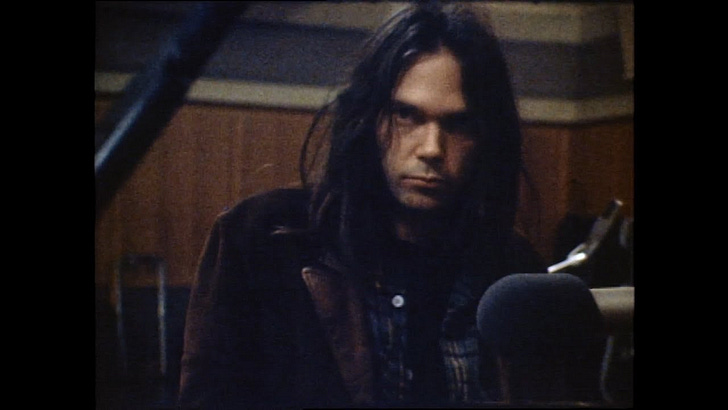A few weeks ago it was Wakanda Forever. This week it was Searching for Sugarman and Neil Young: Harvest Time. I really am quite the crier! As the Germans say, Sie ist nahr Wasser gebaut. (“She’s built near water.”)
Harvest Time is a very shaggy but wonderful composition of footage shot during the recording process for Neil Young’s Harvest, much of which took place in a barn on his Broken Arrow ranch. And that part of the movie is really cool—you watch Neil and his backing band the Stray Gators jamming around, trying to get the feel right for “Alabama.” If you know the guitar solo note for note on the record itself, you get to watch the phrases and ideas come together through a few iterations. But that wasn’t the part that made me cry.
The film also shows Neil recording “A Man Needs a Maid” with the London Symphony Orchestra. There’s something of a philosophical conflict at first: The orchestra musicians hew to the score so closely that aren’t following Neil’s timing. It’s almost as if the transfer of time from Neil, playing a piano at the front of the hall, to the conductor, to the timpani players, introduces a lag that can’t correct itself. Which they manage to correct eventually, but it makes everyone kind of cranky.
The bridge goes: “To live a love/you’ve got to give a love. To live a love/you’ve got to be part of.” It’s a lonely voice in the orchestra hall, going up into the range where it seems it could break. But it doesn’t break. The lushness falls away for the second it takes to say this. And why does that make me cry? I don’t really know. In one way, I think the song is saying something tender and risky. Which is odd—giving to get is a truism. In fact, most of the time when some similar sentiment is invoked, I feel nothing because it’s easy to say the words. But something else happens to them in a song.
There’s a clue earlier in Harvest Time, when Neil is asked about the meaning of the song “Alabama,” an indictment of Southern racism. Why the state Alabama? they ask him. And he says, more or less, it’s a word, a sound. It’s a placeholder. The song is largely about a personal situation, and the content is a kind of mask for him to hide behind. All of the songs are different kinds of masks—but there’s something real behind them. Maybe the masks make it possible for the real thing to show itself.
This is why I’m tired of how we talk about the content of books (or anything else, really). The content isn’t really the content. You can absolutely tell when you begin reading something that has a hidden room behind it. You can tell when the writer is using the words to open up something in themselves. You can also tell when they’re trying to misdirect you, and even (I think) when they haven’t found their hidden rooms yet, or don’t believe they deserve to look for them.
I know that sound a bit superior of me to say. I mean, how do I actually know what level of risk the writer is actually making? I guess I don’t. Maybe that’s why we don’t talk about this stuff as much as conventional “craft” matters—it’s eventually just a hunch. What people write exposes them to an almost rude degree if you really know how to read. It can be kinder to leave the core of things alone. But all of the best teachers I’ve ever had have taken the risk of pointing to the core, of asking for more risk.
When I was just out of college, I got to go to the Bucknell Seminar for Younger poets and spend—I think it was three weeks? But it felt like forever, in the best way—with nine other poets my same age. David St. John and Mary Ruefle were our guest instructors. I don’t remember much about our workshop with Mary except that I was trying too hard and she could tell (although she was very nice about it, and gave me great advice), and there was one day where we were reading someone’s poem and Mary pointed to a line and said, “I’m getting ‘strawberries’ here.” She meant actual strawberries; the line was making her think about strawberries, even though it gave no outward sign. She was right! Yes, strawberries, the writer of the poem said. We were all amazed! And Mary Ruefle said, “Well, there you go.”
I don’t know what’s in the hidden room in the bridge of “A Man Needs a Maid.” And I don’t know why the figure of the lone singer at a piano, surrounded by a massive and impressive orchestra, made the risk in that room so clear. (It’s always a risk to talk about love.) But I’m grateful for the way in.
Keep reading with a 7-day free trial
Subscribe to white noise maker to keep reading this post and get 7 days of free access to the full post archives.



